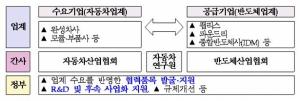Ministry of Industry, Future Vehicle-Semiconductor Solidarity and Cooperation Council launched
Developing and supporting cooperation models between automobile-semiconductor companies
[에너지신문] In order to strengthen the competitiveness of future mobility, domestic automobile-semiconductor companies gathered together to seek cooperation measures such as stable supply and demand of automotive semiconductors, which are the core fields.
The Ministry of Trade, Industry and Energy (Minister Sung Yun-mo) announced on the 4th that it had launched the’Future Vehicle-Semiconductor Solidarity and Cooperation Council’ and discussed cooperation and support plans between domestic automobile-semiconductor companies.

The domestic automobile and semiconductor industries each have the world’s best capabilities, but the capabilities related to automotive semiconductors, which are the core areas of future mobility, are still insufficient.
This is because automakers mostly rely on overseas for core vehicle semiconductors, and semiconductor companies do not have production processes for vehicle semiconductors (MCUs, etc.) whose supply and demand are currently unstable.
The problem is that in the case of core automotive semiconductors, it takes several years, such as process development, facility expansion, and actual vehicle testing, and there is also an international standard certification process. In addition, it is also necessary to secure high reliability and safety even under severe temperature and shock conditions.
Therefore, in order for the automotive-semiconductor industry to promote mid- to long-term cooperation in the field of automotive semiconductors in the future, it is necessary to establish regular cooperation channels to discuss cooperation measures first.
Accordingly, the government launched the’Future Vehicle-Semiconductor Solidarity and Cooperation Council’ together with the automobile-semiconductor industry, and recently sought measures related to the instability of supply and demand for global automotive semiconductors, and planned mid- to long-term plans to preoccupy the future car-semiconductor market and stabilize the domestic supply chain. It was decided to actively establish and promote.
As a short-term measure, the consultative body decided to focus on △international cooperation, △urgent support for import customs clearance, △performance/certification support, and △new consultation channels.
First, at the request of the domestic automobile industry, we are closely discussing with the international community to improve the semiconductor supply and demand situation, and from the 17th of last month to prevent disruption in automobile production, we are supporting rapid customs clearance such as simplified procedures and expedited processing for automotive semiconductor parts.
In addition, due to the characteristics of the automobile industry that requires high reliability and safety, thorough performance verification for vehicle semiconductors is required, so we urgently support the performance evaluation of existing and new semiconductors such as domestic fabless, module and parts companies, and finished vehicle companies. The government decided to promote emergency support for performance evaluation by utilizing the mass production performance evaluation project this year (40 billion won in 2021).
In addition, due to the characteristics of the automotive semiconductor industry, long-term close cooperation between supply and demand companies is required, so the position that the’future car-semiconductor solidarity and cooperation council’, which was launched on this day, will continue to be operated.
The council continued to discuss plans for mid- to long-term cooperation on this day. First, it discovers and supports a cooperation model that is linked between automobile companies and semiconductor companies (foundry, fabless, etc.).
The council plans to use the’Competitiveness Enhancement Committee’, which approves voluntary cooperation attempts by demand-supply companies as a’cooperation model’ for stabilizing the supply chain of small manager items, and provides package support.
In addition, to enhance the competitiveness of the domestic vehicle semiconductor supply chain (value chain), support for technology development, performance and certification, etc. will be strengthened, and related infrastructure will be established.
To this end, we actively support the self-sufficiency of semiconductors and parts for vehicles through related R&D such as next-generation intelligent semiconductor technology development business and autonomous driving technology development innovation business, and promote the establishment of a new dedicated business that reflects the specificity of automotive semiconductors from 2022 until the final mass production of the R&D results. To this end, we will strengthen support for vehicle semiconductor performance evaluation and commercialization.
In order to alleviate the burden of time and cost required for vehicle semiconductor certification, it was decided to promote functional safety test and evaluation and establishment of reliability certification facilities and equipment.
“This global automotive semiconductor supply and demand uncertainty is due to the global semiconductor supply and demand mismatch, and it is difficult to fundamentally solve it in a short period of time,” said Kang Kyung-sung, head of the industrial policy department of the Ministry of Industry, who presided over the meeting. For this, we will use this crisis as an opportunity to increase the competitiveness of future cars and semiconductors.”
The government will actively review industry opinions from today’s council, come up with specific countermeasures, and announce them soon after consultation with relevant ministries.
Copyright © The Energy Newspaper Unauthorized reproduction and redistribution prohibited
